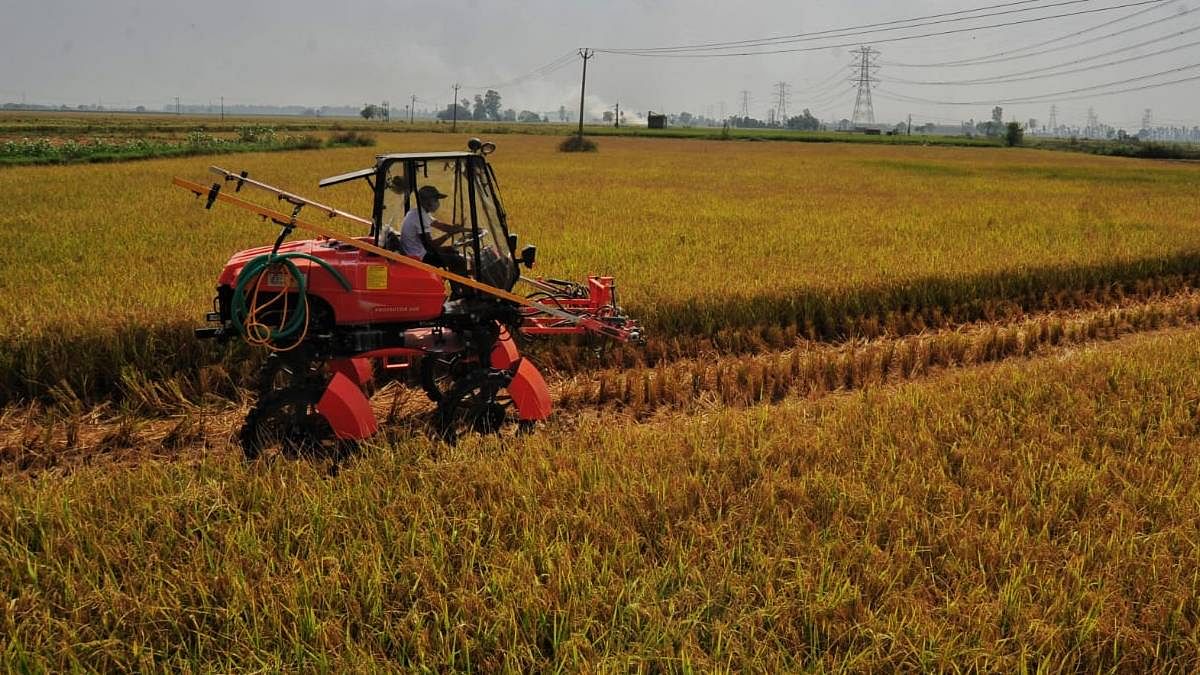New Delhi/Karnal: Om Prakash Singh, a farmer who owns 10-acre land in Jamalpur village in Karnal is optimistic about the new Pusa decomposer that he has used in his field with the help of an agritech company.
Singh says he has opted for the bio-decomposer for its “twin benefits”.
“Till last year, we used to burn stubble despite tussle with government and legal action threats. This year we’ve opted to spray solution as it has twin benefits – it helps avoid burning-related repercussions and provides additional manure with stubble decomposed in soil. A day or two after applying decomposer, the farm will be tilled and watered which will initiate rapid decomposition,” Singh said.
Farmers across Punjab, Haryana and Uttar Pradesh usually harvest paddy in October via mechanised combine harvesters, which leaves behind stubble. The farmers then set fire to the stubble to clear land for the next crop.
During the onset of winter, the stubble burning in the neighbouring states of Punjab, Haryana and Uttar Pradesh leads to a spike in air pollution in the national capital. This leads to the air quality index (AQI) in Delhi often plunging to ‘severe’ and ‘hazardous’ categories.
The central government has been advocating the use of Pusa decomposer, a low-cost microbial bio-enzyme that can decompose crop residues, including stubble from paddy crops, in a bid to prevent farmers from setting them on fire.
In 2020, the government provided Pusa Decomposer, developed by ICAR-Indian Agriculture Research Institute (IARI), to several states on a trial basis for crop residue management.
Moreover, IARI has licensed this technology to 12 companies for mass multiplication and marketing of the bio-decomposer.
Now, this year, over 25,000 farmers from 17 districts of Punjab and Haryana have registered with an agri-tech firm, nurture.farm, to use Pusa decomposer on their fields. The farmers say the decomposer seems to be good and will help reduce the fertiliser cost.
Rajveer Singh, a farmer from Karnal said, “We used to burn stubble earlier as managing it by machines costs at least Rs 4,000-5,000/acre with high fuel and labour cost. However, this year, on 22 September, I harvested my paddy crop, sprayed PUSA decomposer on 24 September and tilling was done on 28 September. After irrigation, the fields got ready in the next few days for upcoming crop sowing season. The stubble decomposed in soil reduces fertiliser consumption by at least 20 kg/acre – from 50 kg to 30 kg. I’ll tell everyone around to spray bio-decomposer on their fields.”
Also read: Pusa tablets — the microbial cocktail that gives farmers an alternative to stubble burning
Reduced fertiliser input, fuel cost
Apart from reduced fertiliser input cost, bio decomposer also helps lower machine, fuel and labour costs during sowing of the next crop.
Praveen Sharma, who has already sown the mustard crop after spraying Pusa bio decomposer, said: “Earlier, nutrients of soil’s top layer got burnt but now they remain in soil. Earlier 4 bags of urea were used per acre which has been reduced to 2-2.5 bags per acre now. Similarly, DAP usage has also gone down from 3 bags to 1 bag, reducing costs by Rs 3,000/acre. My crop will also mature early and I will get a better price compared to glut season.”
Another Haryana farmer, Om Prakash Singh, said: “Earlier, after burning stubble, 4-6 rounds of tilling was required by machine which has been reduced to barely 2-3 now. Overall cost-saving of machine, labour, fuel is Rs 1,000/acre.”
The bio-decomposers can also be a source of additional income for farmers as early clearing of fields will help them plant short-duration cash crops such as coriander before sowing long-term crops such as wheat or mustard.

Spraying solution
The agritech startup firm, nurture.farm, located in Bengaluru, which is spearheading the initiative to provide farmers cost-effective and sustainable farming solutions, has tied up with IARI to improvise Pusa decomposer by providing capsules developed by it into a ready-to-use spray solution.
Pranav Tiwari, Chief Technology Officer of the agritech company, told ThePrint, “The capsules were not easy to deploy as they had to be fermented for a couple of weeks with jaggery and chickpea flour in water before being applied. We converted this into ready-to-use powder formulation which can be mixed with water and sprayed instantly.”
“After spraying the Pusa decomposer, the soil is tilled in the next couple of days. Mixing stubble with the soil and the latter’s pre-existing moisture creates perfect decomposition condition for turning into manure and enriching the soil nutrient value.
“One important element of soil quality is organic carbon content which is present in the stubble and with decomposition is fixed back in soil, making it extremely fertile and rich. This solution can be deployed at 1/4th- 1/5th cost of other alternative solutions like happy seeder or manual labour which cost Rs 3,000-4,0000/acre, while spraying just costs Rs 600/acre. This year we will cover 5 lakh acres and over 25,000 farmers aiming to completely eliminate fires in the next 2-3 years.”
Also read: We burn stubble ‘out of desperation’ because govt hasn’t found solutions, Punjab farmers say



